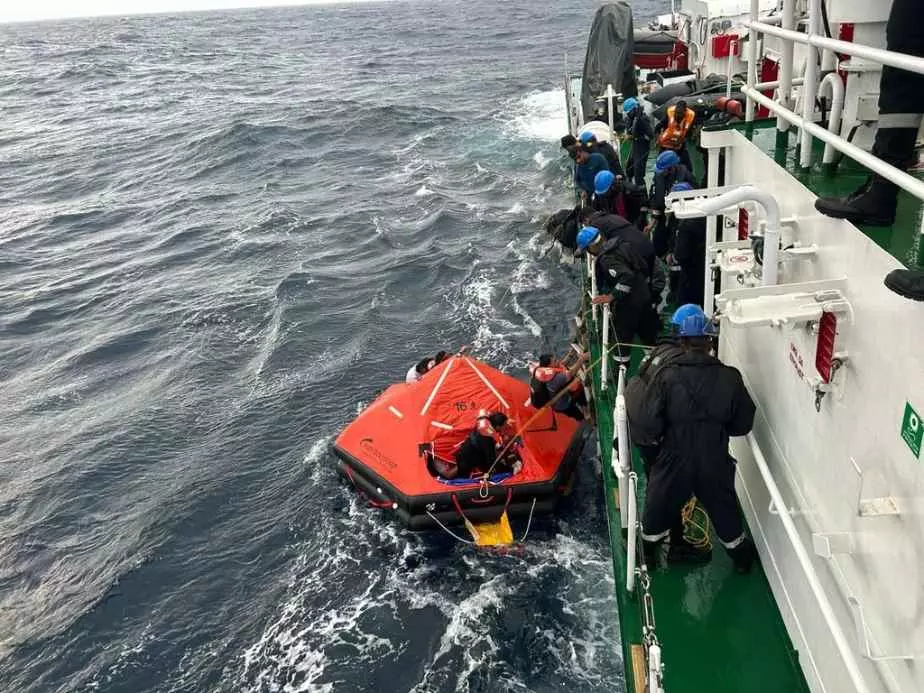
Indian Coast Guard personnel conduct a rescue operation following a distress call from a Liberian container vessel that developed a critical 26-degree list nearly 38 nautical miles southwest of Kochi. The vessel carrying marine fuel tilted further and lost more containers into the sea off the coast of Kerala, officials said on Sunday. Photo: X |@IndiaCoastGuard
Kerala rushes to contain environmental, economic risks after sinking of container ship
The sunken ship has raised environmental concerns along Kerala coast, with authorities monitoring for potential oil spills, hazardous leaks, and marine pollution

The sinking of the Liberia-flagged container ship MSC Elsa 3 off Kerala’s coast has intensified environmental concerns about oil spills in Indian waters, as approximately 100 containers and fuel oil have leaked into the Arabian Sea.
The incident, discussed in a high-level meeting led by Chief Secretary Dr A Jayathilak, has prompted urgent action to mitigate environmental and economic risks along Kerala’s ecologically sensitive coastline.
Containing damage
On May 24, 2025, MSC Elsa 3, en route from Vizhinjam to Kochi, tilted dangerously 38 nautical miles southwest of Kochi. It was carrying 640 containers (including 13 with hazardous cargo like calcium carbide) and 451.54 metric tonnes of marine fuels (84.44 tonnes diesel, 367.1 tonnes VLSFO).
The vessel sank completely 14.6 nautical miles from Thottappally Spillway, with around 100 containers and fuel oil leaking into the sea.
The Indian Coast Guard (ICG) and Navy rescued all the 24 crew members, but rough seas prevented the towing of the ship, leading to the ship capsizing on May 25.
The ICG has deployed two vessels and a Dornier aircraft to spray dispersants, with no major oil slick detected yet. Containers are drifting at 3 km/h, likely reaching Alappuzha, Kollam, Ernakulam, and Thiruvananthapuram shores. A state-wide coastal alert has been issued, with the ICG Director General overseeing containment under the National Oil Spill Disaster Contingency Plan.
Sinking of MSC Elba 3
The MSC Elsa 3 is a container feeder vessel originally built in 1997 in Germany by the company E R Schiffahrt. It was initially named Jan Richter and has undergone nine name changes over the years. The ship was converted from a cargo vessel into a container feeder, a process which, according to some maritime experts, can sometimes affect structural integrity, especially in older vessels.
Also read: Kerala: More containers fall into sea as Liberian ship tilts further; entire crew rescued
As of yesterday, it was sailing under the flag of Liberia. Her length overall (LOA) is 183.91 meters and her width is 25.3 meters.
“The weather was rough, and there must have been some internal issues within the vessel. We cannot say exactly what caused the accident at this point. The company will conduct a detailed investigation. As survivors, we are grateful to the Indian Navy and Coast Guard for their efforts and flawless communication. That’s all I can say for now,” said Alexander Ivanov, the ship’s captain.
The 24-member crew comprised sailors from Russia and the Philippines, as per the initial reports.
Response measures
The high-level meeting chaired by Kerala chief secretary outlined robust response measures.
Coastal communities are instructed to avoid touching containers or debris, maintain a 200-meter distance, and report sightings to 112. Fishing is banned within 20 nautical miles of the wreck and state-wide as well due to the weather conditions.
The Factories and Boilers Department will deploy JCBs and cranes, with two rapid response teams in southern districts (from Thrissur) and one in northern districts to remove containers safely. The Pollution Control Board will lead similar teams to handle oil spills reaching the shore.
Additional booms and skimmers are being mobilized, and there is a plan to address oil sinking to the seabed involving the ICG, Navy, the forest department, and others. Priority is given to public safety, environmental protection, and the fisheries sector, with District Disaster Management Authorities and police providing support.
Earlier oil spills
India’s 7,500-km coastline, a hub for international shipping, has faced several oil spills.
The 2010 MSC Chitra collision off Mumbai spilled 800 tonnes of fuel oil, damaging mangroves and fisheries, with 400 containers, some carrying toxic pesticides, lost at sea. The subsequent cleanup involved 2,000 workers, and fishing bans lasted months.
In 2017, a collision off Chennai’s Ennore Port between BW Maple and Dawn Kanchipuram released 100 tonnes of oil, killing 100 Olive Ridley turtles and disrupting fishing until May.
In 2021, the sinking of X-Press Pearl off Sri Lanka, though outside Indian waters, impacted Kerala with chemical and microplastic pollution, highlighting transboundary risks.
Kerala at high risk
Meanwhile, with this recent incident, Kerala’s 589-km coastline, reliant on tourism and fisheries, is at high risk. Kochi Port, handling 10 million tonnes of petroleum annually (2019–2020), is a critical hub.
The Kerala State Disaster Management Authority (KSDMA) has identified Ernakulam, Thiruvananthapuram, and Kasargod as high-risk zones. The MSC Elsa 3 incident, with potential oil and hazardous cargo washing ashore, threatens marine biodiversity and livelihoods.
The KSDMA has warned against handling debris, especially in Alappuzha and Ernakulam, where containers are likely to drift. The MSC Elsa 3 incident exposes gaps in India’s maritime safety framework, despite the ICG’s advanced response capabilities.
The 1996 National Oil Spill Disaster Contingency Plan (updated 2006) coordinates efforts, but past incidents like MSC Chitra revealed issues in rapid response and liability enforcement under the Environment Protection Act of 1986. The increasing volume of maritime traffic and hazardous cargo calls for stricter vessel inspections and crew training.
The MSC Elsa 3 sinking, possibly due to strong winds or loading imbalances, underscores these needs.
As containment operations continue, the ICG, Navy, and KSDMA are on high alert. The incident, discussed by senior officials including additional chief secretaries and district collectors, emphasizes the need for enhanced preparedness, public awareness, and international cooperation.
India’s history of oil spills serves as a warning, urging stakeholders to prioritize safety and sustainability to protect Kerala’s coastal ecosystems and communities.
Next Story

